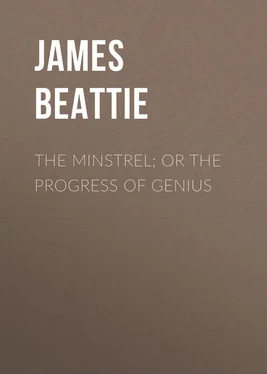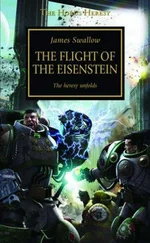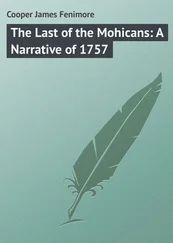James Beattie - The Minstrel; or the Progress of Genius
Здесь есть возможность читать онлайн «James Beattie - The Minstrel; or the Progress of Genius» — ознакомительный отрывок электронной книги совершенно бесплатно, а после прочтения отрывка купить полную версию. В некоторых случаях можно слушать аудио, скачать через торрент в формате fb2 и присутствует краткое содержание. ISBN: , Жанр: foreign_antique, foreign_prose, foreign_poetry, на английском языке. Описание произведения, (предисловие) а так же отзывы посетителей доступны на портале библиотеки ЛибКат.
- Название:The Minstrel; or the Progress of Genius
- Автор:
- Жанр:
- Год:неизвестен
- ISBN:http://www.gutenberg.org/ebooks/27221
- Рейтинг книги:5 / 5. Голосов: 1
-
Избранное:Добавить в избранное
- Отзывы:
-
Ваша оценка:
- 100
- 1
- 2
- 3
- 4
- 5
The Minstrel; or the Progress of Genius: краткое содержание, описание и аннотация
Предлагаем к чтению аннотацию, описание, краткое содержание или предисловие (зависит от того, что написал сам автор книги «The Minstrel; or the Progress of Genius»). Если вы не нашли необходимую информацию о книге — напишите в комментариях, мы постараемся отыскать её.
The Minstrel; or the Progress of Genius — читать онлайн ознакомительный отрывок
Ниже представлен текст книги, разбитый по страницам. Система сохранения места последней прочитанной страницы, позволяет с удобством читать онлайн бесплатно книгу «The Minstrel; or the Progress of Genius», без необходимости каждый раз заново искать на чём Вы остановились. Поставьте закладку, и сможете в любой момент перейти на страницу, на которой закончили чтение.
Интервал:
Закладка:
A stifled smile of stern vindictive joy
Brightened one moment Edwin’s starting tear. —
‘But why should gold man’s feeble mind decoy,
‘And innocence thus die by doom severe?’
O Edwin! while thy heart is yet sincere,
The assaults of discontent and doubt repel:
Dark even at noontide is our mortal sphere;
But let us hope; to doubt, is to rebel;
Let us exult in hope, that all shall yet be well.
Nor be thy generous indignation checked,
Nor checked the tender tear to misery given;
From Guilt’s contagious power shall that protect,
This soften and refine the soul for heaven.
But dreadful is their doom, whom doubt hath driven
To censure Fate, and pious hope forego;
Like yonder blasted boughs by lightning riven,
Perfection, beauty, life, they never know,
But frown on all that pass, a monument of woe.
Shall he, whose birth, maturity, and age,
Scarce fill the circle of one summer-day,
Shall the poor gnat, with discontent and rage,
Exclaim that Nature hastens to decay,
If but a cloud obstruct the solar ray,
If but a momentary shower descend!
Or shall frail man Heaven’s dread decree gainsay,
Which bade the series of events extend
Wide through unnumbered worlds, and ages without end!
One part, one little part, we dimly scan,
Through the dark medium of life’s feverish dream;
Yet dare arraign the whole stupendous plan,
If but that little part incongruous seem.
Nor is that part, perhaps, what mortals deem;
Oft from apparent ill our blessings rise.
O then, renounce that impious self-esteem,
That aims to trace the secrets of the skies:
For thou art but of dust; be humble, and be wise.
Thus, Heaven enlarged his soul in riper years.
For Nature gave him strength, and fire, to soar,
On Fancy’s wing above this vale of tears;
Where dark cold-hearted sceptics, creeping, pore
Through microscope of metaphysic lore:
And much they grope for truth, but never hit.
For why? their powers, inadequate before,
This art preposterous renders more unfit;
Yet deem they darkness light, and their vain blunders wit.
Nor was this ancient dame a foe to mirth.
Her ballad, jest, and riddle’s quaint device,
Oft cheered the shepherds round their social hearth;
Whom levity or spleen could ne’er entice
To purchase chat or laughter at the price
Of decency. Nor let it faith exceed,
That Nature forms a rustic taste so nice.
Ah! had they been of court or city breed,
Such delicacy were right marvellous indeed.
Oft when the winter-storm had ceased to rave,
He roamed the snowy waste at even, to view
The cloud stupendous, from the Atlantic wave
High-towering, sail along the horizon blue:
Where, ’midst the changeful scenery ever new,
Fancy a thousand wondrous forms descries,
More wildly great than ever pencil drew;
Rocks, torrents, gulfs, and shapes of giant size,
And glittering cliffs on cliffs, and fiery ramparts rise.
Thence, musing, onward to the sounding shore,
The lone enthusiast oft would take his way,
Listening, with pleasing dread, to the deep roar
Of the wide-weltering waves. In black array
When sulphurous clouds rolled on the vernal day,
Even then he hastened from the haunt of man,
Along the darkening wilderness to stray,
What time the lightning’s fierce career began,
And o’er heaven’s rending arch the rattling thunder ran.
Responsive to the sprightly pipe, when all
In sprightly dance the village-youth were joined,
Edwin, of melody aye held in thrall,
From the rude gambol far remote reclined,
Soothed with the soft notes warbling in the wind.
Ah then, all jollity seemed noise and folly.
To the pure soul, by Fancy’s fire refined,
Ah, what is mirth, but turbulence unholy,
When with the charm compared of heavenly melancholy!
Is there a heart that music cannot melt?
Ah me! how is that rugged heart forlorn!
Is there, who ne’er those mystic transports felt,
Of solitude and melancholy born?
He needs not woo the Muse; he is her scorn.
The sophist’s rope of cobweb he shall twine;
Mope o’er the schoolman’s peevish page; or mourn,
And delve for life, in Mammon’s dirty mine;
Sneak with the scoundrel fox, or grunt with glutton swine.
For Edwin, Fate a nobler doom had planned;
Song was his favourite and first pursuit.
The wild harp rang to his adventurous hand,
And languished to his breath the plaintive flute.
His infant muse, though artless, was not mute:
Of elegance, as yet, he took no care;
For this of time and culture is the fruit;
And Edwin gained, at last, this fruit so rare:
As in some future verse I purpose to declare.
Meanwhile, whate’er of beautiful, or new,
Sublime, or dreadful, in earth, sea, or sky,
By chance, or search, was offered to his view,
He scanned with curious and romantic eye.
Whate’er of lore tradition could supply
From Gothic tale, or song, or fable old,
Roused him, still keen to listen and to pry.
At last, though long by penury controuled,
And solitude, his soul her graces ’gan unfold.
Thus, on the chill Lapponian’s dreary land,
For many a long month lost in snow profound,
When Sol from Cancer sends the season bland,
And in their northern cave the storms hath bound;
From silent mountains, straight, with startling sound,
Torrents are hurled; green hills emerge; and lo,
The trees with foliage, cliffs with flowers are crowned;
Pure rills through vales of verdure warbling go;
And wonder, love, and joy, the peasant’s heart o’erflow.
Here pause, my Gothic lyre, a little while.
The leisure hour is all that thou can’st claim.
But on this verse if Montagu should smile,
New strains, ere long, shall animate thy frame:
And his applause to me is more than fame;
For still with truth accords his taste refined.
At lucre or renown let others aim,
I only wish to please the gentle mind,
Whom Nature’s charms inspire, and love of humankind.
THE MINSTREL; BOOK SECOND
Doctrina sed vim promovet insitam,
Rectique cultus pectora roborant.
THE MINSTREL; OR, THE PROGRESS OF GENIUS.
BOOK SECOND
Of chance or change, O let not man complain,
Else shall he never never cease to wail:
For, from the imperial dome, to where the swain
Rears the lone cottage in the silent dale,
All feel the assault of fortune’s fickle gale;
Art, empire, earth itself, to change are doomed;
Earthquakes have raised to heaven the humble vale;
And gulfs the mountain’s mighty mass entombed;
And where the Atlantic rolls wide continents have bloomed.
But sure to foreign climes we need not range,
Nor search the ancient records of our race,
To learn the dire effects of time and change,
Which in ourselves, alas! we daily trace.
Yet, at the darkened eye, the withered face,
Or hoary hair, I never will repine:
But spare, O Time, whate’er of mental grace,
Of candour, love, or sympathy divine,
Whate’er of fancy’s ray, or friendship’s flame, is mine.
Интервал:
Закладка:
Похожие книги на «The Minstrel; or the Progress of Genius»
Представляем Вашему вниманию похожие книги на «The Minstrel; or the Progress of Genius» списком для выбора. Мы отобрали схожую по названию и смыслу литературу в надежде предоставить читателям больше вариантов отыскать новые, интересные, ещё непрочитанные произведения.
Обсуждение, отзывы о книге «The Minstrel; or the Progress of Genius» и просто собственные мнения читателей. Оставьте ваши комментарии, напишите, что Вы думаете о произведении, его смысле или главных героях. Укажите что конкретно понравилось, а что нет, и почему Вы так считаете.












